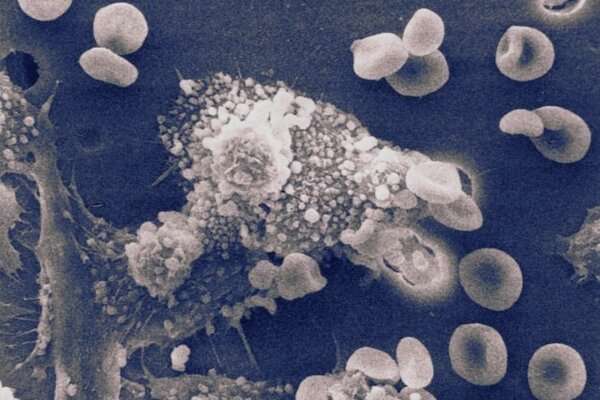This article has been reviewed according to Science X's editorial process and policies. Editors have highlighted the following attributes while ensuring the content's credibility:
fact-checked
peer-reviewed publication
trusted source
proofread
Engineered white blood cells can eliminate cancer, shows study

By silencing the molecular pathway that prevents macrophages from attacking our own cells, University of Pennsylvania engineers have manipulated these white blood cells to eliminate solid tumors.
Cancer remains one of the leading causes of death in the US at over 600,000 deaths per year. Cancers that form solid tumors such as in the breast, brain, or skin are particularly hard to treat. Surgery is typically the first line of defense for patients fighting solid tumors. But surgery may not remove all cancerous cells, and leftover cells can mutate and spread throughout the body. A more targeted and wholistic treatment could replace the blunt approach of surgery with one that eliminates cancer from the inside using our own cells.
Dennis Discher, Robert D. Bent Professor of Chemical and Biomolecular Engineering, and postdoctoral fellow Larry Dooling provide a new approach in targeted therapies for solid tumor cancers in their study, published in Nature Biomedical Engineering. Their therapy not only eliminates cancerous cells, but teaches the immune system to recognize and kill them in the future.
"Due to a solid tumor's physical properties, it is challenging to design molecules that can enter these masses," says Discher. "Instead of creating a new molecule to do the job, we propose using cells that 'eat' invaders—macrophages."
Macrophages, a type of white blood cell, immediately engulf and destroy—phagocytize—invaders such as bacteria, viruses, and even implants to remove them from the body. A macrophage's innate immune response teaches our bodies to remember and attack invading cells in the future. This learned immunity is essential to creating a kind of cancer vaccine.
But, a macrophage can't attack what it can't see.
"Macrophages recognize cancer cells as part of the body, not invaders," says Dooling. "To allow these white blood cells to see and attack cancer cells, we had to investigate the molecular pathway that controls cell-to-cell communication. Turning off this pathway—a checkpoint interaction between a protein called SIRPa on the macrophage and the CD47 protein found on all 'self' cells—was the key to creating this therapy."
The engineered macrophages were put to the test on "tumoroids," conglomerates of mouse melanoma cells in culture plates. The macrophages cooperatively clustered around the cancer cells, picked them apart and progressively destroyed the tumor.
When tested in vivo, the engineered cells were able to eliminate tumors in 80% of mice. Importantly, tumor elimination triggered an adaptive immune response. Weeks later, the anti-cancer immunoglobulin G antibody increased.
This engineered macrophage therapy works best in combination with existing antibody therapy. One day, patients may be able to rely on these engineered cells to eliminate solid tumors as well as the need for future treatments.
Macrophage therapy may be the key to a cancer vaccine, destroying cancer cells and teaching the body to destroy emerging cancer cells in the future—a gamechanger in the fight against cancer.
Multiple members in the biophysical engineering lab led by Dennis Discher, including co-lead author and postdoctoral fellow Jason Andrechak and Ph.D. student Brandon Hayes, contributed to this study.
More information: Lawrence J. Dooling et al, Cooperative phagocytosis of solid tumours by macrophages triggers durable anti-tumour responses, Nature Biomedical Engineering (2023). DOI: 10.1038/s41551-023-01031-3

















